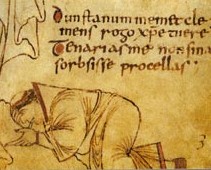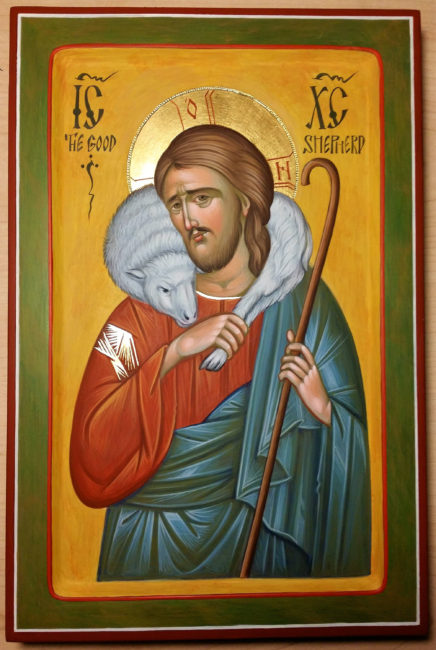Sermon — July 18, 2021
The Rev. Greg Johnston
Alice and I have had quite a few landlords in the last dozen years or so, from universities and big management companies to a guy who lived a few towns over to someone who lived in North Carolina and could only be reached through the manager of the convenience store next door. Some landlords are more responsive when there are problems, some are less so, and we’re used to that. But as I walked through our new apartment with an inspector on Wednesday, it struck me: this was the first place we’d be living as adults that was really ours. This was our breezy porch, our spacious kitchen, our completely-dysfunctional toilet chains. (One won’t flush; one won’t stop flushing.) This was our new home.
Whether you rent or buy or live with a friend, there’s a visceral difference between a place you’re staying and a place you can call your own. And you can feel it. When you’re home, I think, you feel a kind of comfort. This is, one hopes, a safe place, a place in which you have no master, and no boss. A place you can relax and be yourself. (And fix the toilet.) Shelter is one of the most basic human needs. But “home” isn’t too far behind.
You can almost see King David’s mind working through these thoughts in today’s first reading. After years of tumult and war, the Lord has finally “given him rest from all his enemies around him,” and “now…the king [is] settled in his house.” (2 Sam. 7:1) And it’s pretty good. David, you might remember, had spent years out in the pastures with his sheep, and then years more out in the countryside, as a soldier, a fugitive, a king. There were days he was so hungry that he and his companions took holy bread from the temple to eat. This palace, though—this palace isn’t half bad.
And now that the king is settled in his house, his mind turns to God. David had a new home; but God did not. There was no Temple, there was no permanent physical place in which the holiest objects dwelt. There was a tent, the Tabernacle, the portable shrine in which had God lived as the people traveled in the wilderness, and in which God’s presence had remained in the centuries leading down to David’s own day.
“But God,” you can hear David thinking, “Don’t you want a home? Don’t you see how nice this is? How comfortable? How glorious? How can it be that ‘I am living in a house of cedar, but the ark of God stays in a tent?’” (2 Sam. 7:2) And the prophet Nathan can almost read his mind. “Go,” he says, “do all that you have in mind; for the Lord is with you.” (2 Sam. 7:3)
But he’s only half-right. God comes to Nathan in a dream and tells him David’s got it all wrong. It’s not David who will build God a house; it’s God who will build David a house, not a physical house but a royal house, a dynasty to lead and guide his people. “Thus says the Lord,” goes the message, “I will raise up your offspring… and I will establish his kingdom. He shall build a house for my name, and I will establish the throne of his kingdom forever. I will be a father to him, and he shall be a son to me.” (2 Sam. 7:8, 12-14)
On one level, this is quite literally true. David’s son Solomon, who’s not yet been born, will inherit his throne. It’s Solomon, not David, who will build the Temple as a house for God.
But Solomon’s kingdom will not quite be “established forever.” In fact, when Solomon’s own son rises to the throne, the kingdom will split in two halves, north and south, and it will never be united again. The House of God, meanwhile, will be destroyed a few centuries later, and mourned, and restored; and then destroyed again, never to be rebuilt.
By Jesus’ day, there hadn’t been a descendant of David on the throne in five hundred years. During the first few decades of the Church, the Temple, too, would be destroyed forever. And so it was that the early Christians came to understand these words in a very different way. The “offspring” of David to whom God promised an eternal kingdom was not his son Solomon, but his great-great-great-great-great-great…great-great-grandson Jesus. It was his throne that would be established forever. It was he to whom God would be a father; it was he who would be the Son of God.
And it would be his body that would be a “holy temple in the Lord.” (Eph. 2:21) Not the house of God once built in Jerusalem as the Temple. Not even the physical body of Christ, in which God dwelt. But the Body of Christ as in the Church. Not this church, the building. Not our church, the people. But the Church, the universal body in which we are, as the Letter to the Ephesians writes, “no longer strangers and aliens, but fellow-citizens” living together in one eternal home, built on Christ the cornerstone and stretching back before Christ to the prophets and forward through the apostles and all the way down to us as we are “built together spiritually into a dwelling place for God.” (Eph. 2:19-22)
For “Christ,” Paul writes, “has broken down the dividing wall, that is, the hostility between us.” (Eph. 2:14) It’s not just a metaphor. The “Temple” was a huge outdoor complex, made up of a series of concentric rings, with the Temple proper just a tiny building at the center. The outer areas were open to everyone, but as you neared the center access was restricted. There was a “Court of the Gentiles” open to all, and then a series of walls. Israelite women could come so far, and no further; Israelite men a little further; priests a little further; and all the way inside the Temple itself, the Holy of Holies, which only the high priest could enter and only on the holiest of days. And they took these divisions seriously. Inscribed on the wall of Temple during the Herodian era were the ominous words, written in Greek, the Gentiles’ common language, so they’d understand: “No foreigner may enter within the railing and enclosure surrounding the temple. Whoever is captured will have himself to blame for his subsequent death.”
Paul is playing with this idea. Christ has “broken down the dividing wall.” Christ has brought all the nations of the world into the holy and beloved people of God. We’re no longer “far off” from the holy place. We’ve been brought near. All of us are at home, in this one household of God, whoever or wherever we are. And thanks be to God for this universal embrace.
And yet: oh no!
Because that means the house of God, this long-promised family that God is gathering from all the nations of the earth, includes Them too. I don’t mean “Them” as in the Jews; not “Them” as in the Gentiles. I mean Them, whoever They are in your life. Those members of that political party whose ideas you find abhorrent and un-American. Those people from those places, who started moving in and the neighborhood has never been the same. Those members of your family with whom you just don’t talk about that topic, especially at Thanksgiving, lest the turkey be sent flying across the room in rage!
Them! You know Them, right?
I’m sorry to say, you’re going to have to share a house.
(And you thought the toilet chains were annoying.)
I went to a great workshop on conflict a few years ago, led by two of the brothers at the monastery in Cambridge. When you take life vows as a monk, you’re committing yourself to a life of more than a little domestic frustration. You’re choosing to live together forever with a group of other human beings, with all their foibles, without even the consolation of romantic love or biological relationship to make it easier to deal with them. So monks, as much as you might think of them as pious and ethereal, are really very good at petty disputes. They have them all the time. And I remember what Brother Curtis said about the people who get under your skin. “God loves you,” he said. “And God loves them. God loves you, God wants to spend eternity with you. And them. Together.”
And that’s is the issue, isn’t it? The dividing walls between us, whatever they are, are gone! We are being built together into one household, one holy dwelling place for God. We have an eternal home in God’s love. And yet it’s not our house. Our names aren’t even on the lease. Or rather, we are among a billion squabbling roommates who can never quite agree whose turn it is to take out the trash.
But we’d better work it out, because whoever They are in your life—whoever the people are whom you simply cannot stand, for reasons good or bad—they are the beloved children of God with whom you will, God willing, spend eternity.
Thank God we don’t have to work it out alone.
I said earlier than Nathan was only half-right. “Do all you have in mind” he tells David. “The Lord is with you.” He just means “God will support your plan.” He’s wrong about that—God’s going to tell him soon enough—but he’s right about something. “The Lord is with you,” God says through Nathan’s lips. You don’t need to build God a house; God is with you now. And indeed, God says, “I have been with you wherever you went—I have been moving about!” (2 Sam. 7:9, 5) God is building us a house; or rather, God is building us into a house, and God is not going to leave us alone but is coming to dwell among us.
We live in fractious times. Families, nations, even churches find themselves divided. And many of our conflicts and disagreements are important. (If they weren’t important, they wouldn’t be conflicts!) There is conflict any time someone tries to make the world a better place. And sometimes the stakes are life and death.
But Christ has reconciled us all in one body to God, and has proclaimed peace “to those who are far off and to those who are near.” (Eph. 2:17) And our reconciliation with one another will be powered by the Holy Spirit of love that lives among us. This doesn’t mean we have to compromise. It doesn’t mean we have to give up our own values. But it does mean that we need to find a way to live together. Because God has broken down the dividing wall. God has built us into a one house, one spiritual dwelling place for God. And we’re all going to live in it.


